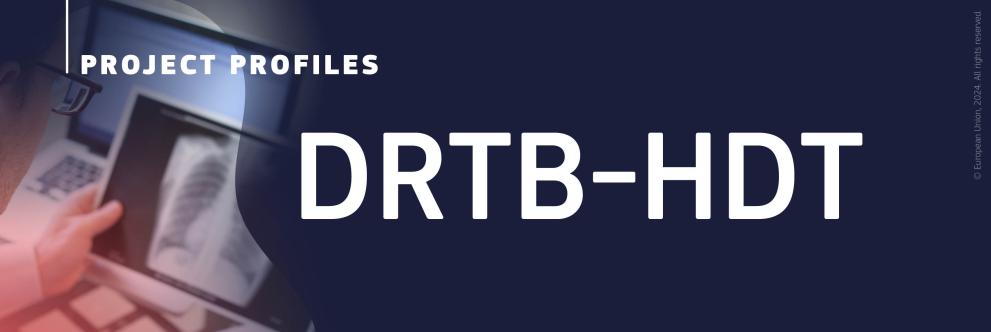
Today marks World Tuberculosis Day. Despite years of global efforts to develop new vaccines and treatments, tuberculosis (TB) remains a leading cause of morbidity and mortality worldwide. The incidence rates of TB are highest in low-income countries, where resources for effective public health campaigns are limited, and within communities affected by poor nutrition, sanitation, and living conditions.
Current TB treatments are long, complex, and often poorly tolerated by patients. The situation is further exacerbated by the increase of drug-resistant forms of TB, such as rifampicin-resistant (RIF-R) TB. The World Health Organisation estimates that in 2016 only 54% of patients who underwent RIF-R TB treatment were able to defeat the disease.
To learn more about what the EU is doing to fight tuberculosis, HaDEA spoke with two experts involved in the Horizon 2020 project DRTB-HDT (Stratified Host-Directed Therapy for Drug-resistant Tuberculosis): Trevor Beattie, technical director at the Aurum Institute, and Dr. Robert Wallis, an infectious disease physician scientist specialised in immunology and drug development.
1. Please present your project and its relevance in the field of tuberculosis/tuberculosis prevention
Current treatments often fail to eradicate the Mycobacterium tuberculosis infection (MTB) and frequently leave patients with permanent impairment of lung function. Host-directed adjunctive treatments (HDTs)1 have the potential to accelerate the eradication of MTB infection and promote the recovery of lung function.
Our study is focusing on two of such HDTs, metformin and CC-11050, which are showing results in preserving and improving lung function.
It aims to compare treatment outcomes in 330 participants across multiple sites in Europe (Moldova, Georgia, and Romania) and Southern Africa (South Africa and Mozambique), where the prevalence and incidence of Rifampicin-resistant TB remain high. Through this research, we aim to evaluate the efficacy of these adjunctive treatments in improving outcomes for patients with Rifampicin-resistant tuberculosis.
While the study trial is ongoing, participants benefit from the expertise of experienced TB professionals and the potential advantages of HDT, which may help limit the loss of lung function. The inclusion of a safe, affordable and effective HDT could prove to be a cost-effective strategy for improving TB treatment outcomes in impoverished and heavily burdened countries.
Ultimately, the generation of evidence through this project, which will inform local and global TB treatment policies, will improve the lives of many.
1. HDTs aim to enhance the antimicrobial activity of the patient (host) in order to control MTB infection and attenuate excessive inflammation in order to minimize tissue damage.
2. What are some of the obstacles that patients face in relation to tuberculosis?
Tuberculosis treatment entails several months of treatment with multiple antimicrobial drugs. However, even after being cured, most patients are left with impaired lung function and shortened longevity, which are the main features of post-TB lung disease (PTLD). Reduced lung function also significantly impacts their quality of life and ability to generate income. There currently are no treatments to prevent or treat PTLD.
Populations residing in poverty-stricken regions bear a heavy burden of TB disease and struggle to access healthcare services. They endure long, complex and poorly tolerated drug regimens, often with limited access to food. Additionally, families or close contacts of the diagnosed TB cases remain at risk of contracting the disease, often lacking access to effective TB preventative therapy or unaware of their eligibility for preventative regimens.
3. How important is the support of EU funding for your project? What are the expected future outcomes of your project?
EU funding is essential for the conduct of this project. We anticipate that it will provide sufficient preliminary data to advance one or both of the HDTs to a definitive phase-3 trial. This would not have been possible without the financial support provided by the Horizon 2020 funding programme.
Background
Horizon Europe is the research and innovation programme of the EU for the period 2021-2027.
The aims of Cluster 1 ‘Health’ include improving and protecting the health and well-being of citizens of all ages by generating new knowledge, developing innovative solutions and integrating where relevant a gender perspective to prevent, diagnose, monitor, treat and cure diseases.
Horizon 2020 (H2020) was the EU’s multiannual funding programme between 2014 and 2020.
Details
- Publication date
- 24 March 2024
- Author
- European Health and Digital Executive Agency
- Programme Sector
- Health
- Programme
- Horizon Europe
- Horizon Europe Cluster 1: Health
- Tags
- EU financing
- Medical research


